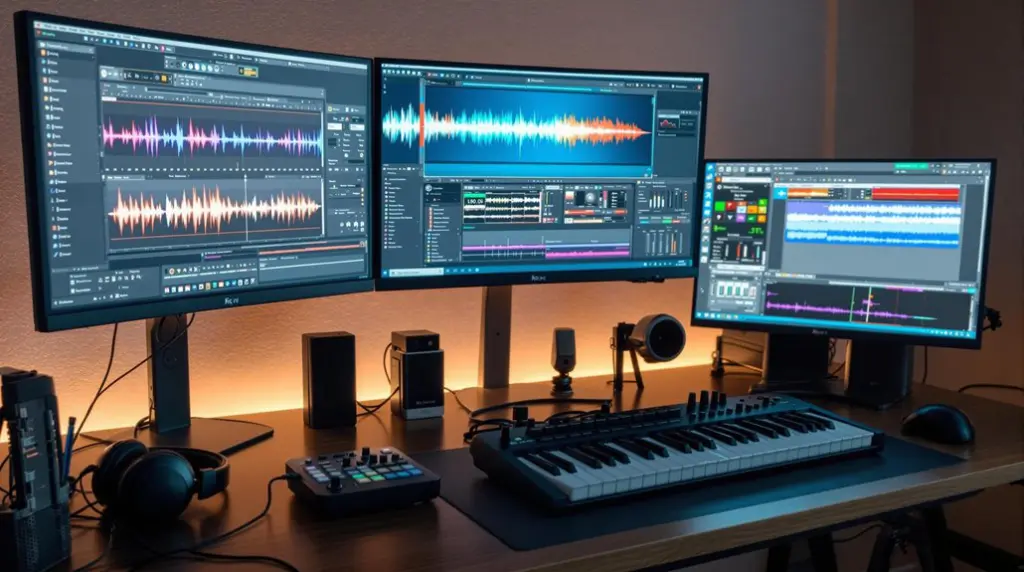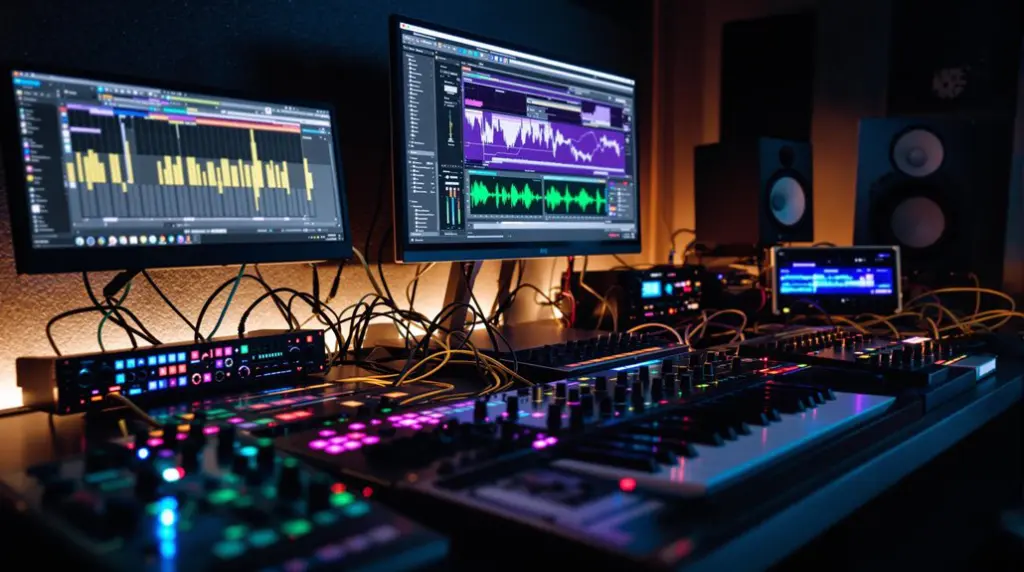AI tools are revolutionizing music production by enhancing creativity and efficiency. Platforms like AIVA and Amper Music enable composers to generate original melodies and lyrics quickly, while automated mixing technologies such as iZotope’s Neutron streamline the production process. Additionally, AI-driven recommendation systems personalize listener experiences, fostering the discovery of diverse artists. As these tools reshape workflows and amplify artistic expression, they also raise important ethical considerations regarding copyright and artist compensation. The future of music production is bright and complex, hinting at a scenery where technology and artistry converge in fascinating ways. Stay tuned to explore these developments further.
Key Takeaways
- AI tools like AIVA and MuseNet enable rapid composition and exploration of diverse music styles, enhancing creativity for musicians.
- Automated mixing and mastering services, such as iZotope’s Neutron and LANDR, streamline production workflows and improve audio quality.
- Personalized recommendation systems enhance music discovery and listener engagement, promoting diverse talent through tailored playlists.
- AI-driven analytics provide valuable insights into audience trends, helping artists understand their market and optimize their strategies.
- Future AI developments promise emotionally resonant compositions and real-time collaboration, transforming the music production landscape.
Overview of AI in Music
As the music industry evolves, the integration of artificial intelligence (AI) has emerged as a transformative force, reshaping how music is created, produced, and consumed.
AI in music production harnesses algorithms to analyze vast datasets, identifying trends that inform innovative music composition. AI-powered tools, such as Amper Music and AIVA, generate original melodies and lyrics, greatly enhancing the creative process for artists.
Furthermore, these technologies streamline audio processing by automating tasks like mixing and mastering, making high-quality production accessible without costly equipment. The rise of automated mixing technologies like iZotope’s Neutron is revolutionizing audio quality control in music production.
On music platforms, AI enhances user engagement through personalized recommendations, curating playlists based on individual listening habits.
Ultimately, AI not only accelerates the workflow but also enriches artistic expression, marking a new era in music.
AI Tools for Composition
The emergence of AI tools has revolutionized the composition process, enabling musicians to navigate the complexities of creativity with unprecedented ease. These innovative platforms, like AIVA and Amper Music, harness generative AI to analyze vast datasets, producing original compositions rapidly. Music producers can now explore new creative expressions without deep theoretical knowledge, thanks to tools such as MuseNet and Jukedeck. Additionally, AI-driven solutions like Soundful and MusicGen help overcome creative blocks by suggesting alternative elements, allowing for seamless innovation across genres. Furthermore, intelligent composition tools analyze data to enhance music creation, empowering artists to push the boundaries of their craft.
| AI Tool | Key Feature | Benefit |
|---|---|---|
| AIVA | Original composition generation | Speed up the composition process |
| MuseNet | Advanced melody creation | Explore unique music styles |
| Soundful | Parameter-driven music creation | Tailor compositions easily |
| Jukedeck | Lyrics and chord progression | Simplify songwriting |
| MusicGen | Text prompt to music translation | Enhance creativity effortlessly |
Enhancing Production Workflows
The integration of AI tools in music production is revolutionizing editing processes and mixing techniques, considerably enhancing overall efficiency.
By automating tedious tasks, these technologies allow producers to allocate more time to creative decision-making and artistic expression.
As a result, the workflow becomes not only faster but also more focused on achieving high-quality sound. Furthermore, AI’s ability to streamline mixing and mastering processes ensures that producers can maintain professional production standards with less effort.
Streamlining Editing Processes
Streamlining editing processes has become a pivotal focus in modern music production, thanks to the integration of AI tools. These innovative technologies automatically analyze audio tracks to identify beats, tempo, and key signatures, considerably reducing the time required for manual adjustments.
Software such as iZotope’s Neutron and Ozone employs AI algorithms to enhance mixing and mastering with real-time suggestions, ensuring a polished final product.
Additionally, AI-driven platforms can effortlessly separate individual audio elements, allowing producers to isolate and manipulate specific parts during editing.
Automated mastering services like LANDR further streamline workflows by delivering high-quality mixes without the need for expensive equipment.
Efficient Mixing Techniques
Efficient mixing techniques have transformed the terrain of music production, enabling producers to achieve high-quality results more swiftly and effectively.
AI algorithms play a pivotal role in the mixing process, automatically identifying and separating audio elements for precise control over individual tracks. Tools like iZotope’s Neutron leverage machine learning to analyze mixes, streamlining workflows and minimizing manual edits.
Automated mixing solutions guarantee consistent processing, enhancing sound cohesion across various playback systems while reducing human error.
Additionally, AI-driven mastering tools such as LANDR provide independent artists with affordable access to professional-quality sound.
Personalization in Music Streaming
The integration of AI algorithms in music streaming platforms revolutionizes how listeners discover and engage with music.
By analyzing user data, these tailored recommendation systems create personalized playlists that resonate with individual preferences, greatly enhancing the overall listening experience.
This adaptive technology not only facilitates the discovery of new artists but also promotes a diverse range of musical talent. Additionally, the use of AI-driven experimentation in music composition allows for richer and more complex musical experiences that can further enrich user engagement.
Tailored Recommendations Algorithms
A growing number of music streaming platforms are increasingly employing AI-driven tailored recommendation algorithms to enhance user engagement and satisfaction.
These sophisticated systems analyze user data, including listening habits and contextual factors, to curate personalized music recommendations that align with individual tastes.
Through utilizing machine learning, platforms like Spotify and Apple Music provide suggestions that adapt to variables such as time of day, location, and mood, reflecting users’ evolving preferences.
As a result, these tailored recommendations algorithms facilitate the discovery of a broader range of music, thereby enriching the listening experience.
Furthermore, the effectiveness of these AI-driven recommendation systems has been linked to higher retention rates, demonstrating their pivotal role in fostering stronger user engagement within the competitive environment of music streaming.
User Data Analysis
Harnessing the power of user data analysis, music streaming platforms are revolutionizing the way listeners experience music. By employing AI algorithms to scrutinize user behavior and preferences, these platforms curate highly personalized recommendations that enhance the overall music listening experience.
Services like Spotify leverage machine learning to track listening habits, producing tailored playlists that align with individual tastes while broadening exposure to diverse genres. Data-driven insights reveal emerging trends and popular tracks, allowing platforms to adjust recommendations dynamically in real time.
This personalization not only boosts user engagement but also enables listeners to discover new artists and songs they might otherwise overlook, fostering a richer musical exploration that keeps audiences captivated and satisfied.
Enhanced Discovery Experience
Music streaming platforms have shifted the terrain of music discovery through advanced AI-driven personalization techniques. AI algorithms analyze user data, including listening habits and contextual factors, to create personalized recommendations that greatly enhance the music discovery experience.
Services like Spotify’s Discover Weekly exemplify this trend, offering tailored playlists that boost user engagement and satisfaction. These personalized suggestions not only resonate with listeners’ tastes but also introduce them to emerging artists and diverse genres they might not have encountered otherwise.
As AI systems continuously learn from users’ evolving preferences, they refine recommendations, creating a more intuitive journey. Ultimately, data analytics empower streaming platforms to identify target audiences, ensuring content remains relevant and engaging for each unique listener.
Discovering New Artists
How can technology reshape the environment of music discovery?
AI algorithms can analyze vast amounts of data from social media and streaming platforms to identify emerging artists and trends. This capability enhances music discovery services, enabling listeners to discover new talents and a diverse range of genres tailored to their preferences.
By utilizing machine learning, these platforms curate playlists that feature rising stars, ensuring that innovative sounds reach a broader audience. Furthermore, AI-driven insights foster an inclusive setting within the music industry, providing opportunities for talented individuals who might otherwise remain unnoticed. Additionally, the implementation of MIDI mapping techniques allows artists to integrate their unique sounds into digital platforms, enhancing their visibility.
As a result, both music enthusiasts and industry professionals can engage with a richer array of musical expressions, transforming how we connect with new artists.
AI in Live Performances
As technology continues to evolve, the integration of AI in live performances is transforming the concert experience into a more interactive and immersive event.
AI technologies analyze real-time audience reactions, enabling performers to make dynamic adjustments that enhance engagement. This innovative approach results in:
- Captivating Visuals: Generative AI creates synchronized displays that mesmerize the audience.
- Enhanced Atmosphere: Smart cameras automate lighting and sound based on crowd responses.
- Virtual Performers: Digital elements blend seamlessly with live action, enriching the experience.
- Unique Engagement: Fans enjoy a concert that transcends traditional boundaries, fostering deeper connections.
High-profile performances, such as Travis Scott’s virtual concert, exemplify this shift, showcasing the remarkable potential of AI in revolutionizing concert experiences. Furthermore, the use of AI-generated music allows artists to explore new soundscapes and enhance their performances in real-time.
Creative Applications of AI
The emergence of innovative melody generation tools, such as MusicGen and MusicLM, has transformed the terrain of music composition by enabling creators to generate complex melodies from simple text prompts.
These personalized applications not only streamline the creative process but also empower content creators to craft unique soundscapes that enhance their storytelling.
As musicians leverage AI to produce original tracks and collaborate more effectively, the potential for fresh ideas and innovative sounds continues to expand. Moreover, AI-driven composition techniques can enhance the creative scope by generating unique melodies that push the boundaries of traditional music production.
Innovative Melody Generation Tools
Revolutionizing the terrain of music composition, innovative melody generation tools harness the power of artificial intelligence to expand creative horizons for musicians and producers alike.
These tools, such as MusicGen and Amper Music, utilize AI algorithms to facilitate melody generation, allowing for:
- Rapid creation of original compositions.
- Unique tracks tailored to specific themes or emotions.
- Overcoming creative blocks by introducing novel musical ideas.
- Enhanced storytelling through customized soundscapes.
Personalized
While traditional music production often involves lengthy creative processes, the advent of AI tools has ushered in a new era of personalization in music composition. AI algorithms can analyze vast music libraries, offering a personalized listening experience by recommending soundtracks that match specific tones and moods. Tools like MusicGen and MusicLM empower creators to generate original compositions from textual descriptions, enhancing creativity and facilitating collaboration between musicians and AI. This innovative approach allows content creators to enrich storytelling through unique AI-generated music, streamlining the production workflow.
| AI Tool | Key Feature |
|---|---|
| MusicGen | Generates melodies from text |
| Amper Music | Composes original tracks |
| MusicLM | Transforms descriptions into music |
| AIVA | Creates innovative musical compositions |
Pros and Cons of AI
As the music industry increasingly incorporates artificial intelligence, both its advantages and disadvantages deserve careful examination.
The pros and cons of AI in music production can be summarized as follows:
- Cost-effectiveness: AI democratizes access, reducing financial barriers for independent artists.
- Innovation increase: By managing technical details, AI allows greater creative exploration, fostering new sounds and genres.
- Data-driven insights: AI analyzes listener preferences, helping artists tailor their music for commercial success.
- Emotional depth limitations: AI-generated music often lacks the emotional nuances and authenticity of human performances, raising concerns about connection.
- Speed and efficiency: AI mastering tools can optimize tracks in seconds, providing professional-quality sound without the need for extensive studio time.
In balancing these factors, the industry must navigate the intricate relationship between technological advancement and the emotional depth that defines true artistry.
Ethical Considerations in AI
The integration of AI into music production not only presents advantages but also raises significant ethical questions that must be addressed. Key ethical considerations revolve around originality and copyright issues, as AI-generated music can closely mimic human-created works, complicating authorship debates.
Additionally, there is growing anxiety among artists regarding job displacement, as automation threatens traditional roles within the industry. Critics highlight that AI often lacks the emotional depth and authenticity fundamental to human artistry, underscoring the need for transparency in AI’s decision-making processes to combat biases.
Moreover, ongoing discussions aim to safeguard artists’ rights and guarantee fair compensation, while also addressing concerns about the potential homogenization of music styles, which could undermine the diversity and richness of artistic expression.
Copyright Challenges in Music
Given the rapid advancements in AI technology, copyright challenges in music have emerged as a pressing concern for artists, producers, and legal experts alike.
The intersection of AI-generated music and copyright law raises critical issues, such as:
- Authorship Ambiguity: Who owns a song created by AI?
- Emotional Depth: Can AI replicate the personal expression of human artists?
- Creative Control: How do artists maintain influence over their work?
- Profit Distribution: Are artists fairly compensated when their music trains AI systems?
Legal frameworks are evolving to address these challenges, emphasizing transparency in AI to protect artists’ rights. The balance between human expertise in mastering and AI automation will be crucial in ensuring that the unique qualities of artistic expression are preserved.
As the music industry grapples with these complexities, the need for equitable solutions becomes increasingly urgent, ensuring that innovation does not undermine artistic integrity.
Innovations in Music Distribution
Innovations in music distribution have transformed the terrain for artists and listeners alike, driven largely by advancements in artificial intelligence.
AI algorithms analyze listener behavior to recommend personalized playlists, enhancing engagement and reach for new artists. Streaming services leverage these insights to curate content, facilitating the discovery of diverse genres and emerging talent.
In addition, data analytics tools enable artists to identify target audiences and market trends, allowing them to tailor their promotional efforts effectively.
Additionally, AI enhances royalty tracking, ensuring accurate compensation and addressing long-standing transparency issues in payment distribution.
Ultimately, the integration of AI in music distribution not only supports artists in traversing the industry but also enriches the listening experience for fans. Moreover, AI mastering tools are becoming essential in ensuring high-quality music production that meets industry standards.
Future Trends in Music Production
As technology continues to evolve, the terrain of music production is poised for significant transformation, driven by advancements in artificial intelligence.
The future trends in this field promise to reshape how music is created and experienced:
- Enhanced AI algorithms will deliver more nuanced and emotional compositions, deepening audience connection.
- Streamlined workflows will allow artists to produce high-quality tracks with unprecedented efficiency.
- Real-time collaboration will break geographical barriers, fostering innovative compositions among musicians.
- Emotional AI will enable personalized music experiences, crafting sound environments tailored to individual moods.
Furthermore, the integration of virtual and augmented reality will create immersive experiences, redefining live performances and audience engagement.
These developments will certainly revolutionize the terrain of music production, enriching both artistry and listener experience.
Frequently Asked Questions
What Is the Future of AI in the Music Industry?
The future of AI in the music industry encompasses enhanced AI creativity, algorithmic composition, and sound analysis, fostering music collaboration, genre blending, personalized playlists, and audience engagement, while addressing crucial ethical considerations surrounding ownership and content generation.
How Is AI Revolutionizing Music?
AI revolutionizes music through innovative composition techniques, intelligent soundscapes, and music analysis algorithms. Automated mixing software and collaborative AI tools enhance creative processes, while adaptive platforms generate melodies, fostering a new era of artistic expression.
Will AI Take Over Music Production?
While AI enhances music production efficiency, it will not fully take over. The human touch remains essential for artistic expression, maintaining music authenticity. Instead, creative collaboration and technology integration will redefine innovation boundaries, alleviating job displacement fears.
How Can AI Be Used in Music Production?
AI in music production enhances creativity through composition techniques, intelligent sound design, and music genre analysis. It streamlines automated mixing processes, adaptive mastering systems, AI-driven lyric generation, collaborative creation, and real-time performance enhancement for artists.
Conclusion
The integration of artificial intelligence into music production heralds a transformative era, characterized by enhanced creativity, efficiency, and personalization. As AI tools reshape composition and streamline workflows, they simultaneously pose ethical and copyright challenges that require careful consideration. The ongoing evolution of music distribution and the potential for discovering new artists further exemplify the profound impact of AI. Future trends indicate that the symbiotic relationship between technology and artistry will continue to redefine the terrain of music production.




